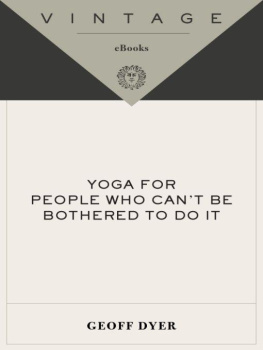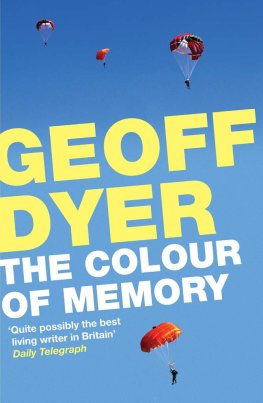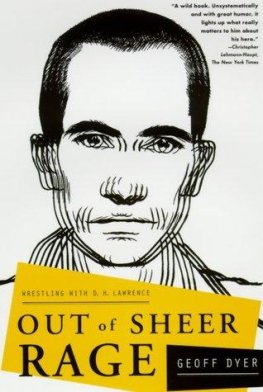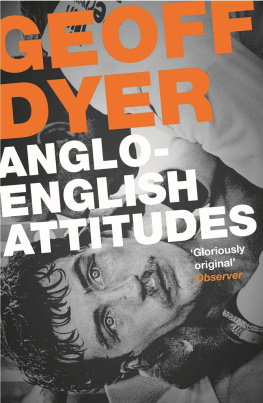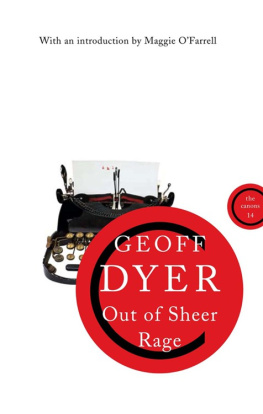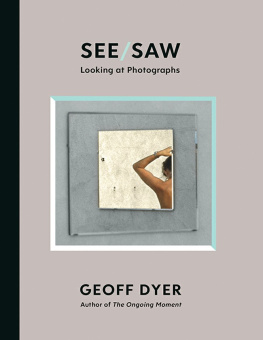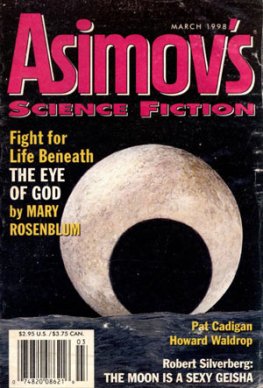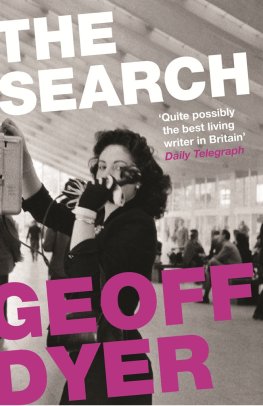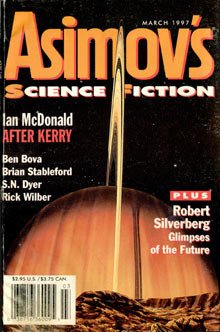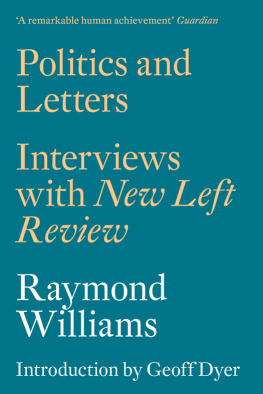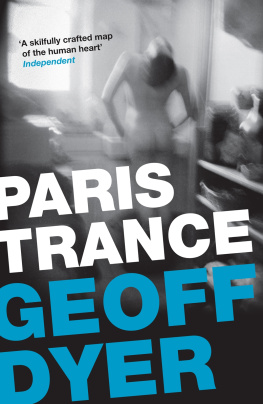Table of Contents
Acclaim for Geoff Dyers
Yoga for People Who Cant Be Bothered to Do It
Will make you laugh out loudand run through the streets in search of adventure. Entertainment Weekly
Quite possibly the best living writer in Britain.... Reading Dyer... [is] akin to the sudden elation and optimism you feel when you make a new friend, someone as silly as you but cleverer too, in whose company you Know you will travel through life more vagrantly, intensely, joyfully. The Telegraph
Consistently witty and insightful.... Dyer casually weaves the likes of Nietzsche and Auden into ruminations on a drug trip in Paris, a friendship in New Orleans, a desert ruin in Libya. Esquire
Geoff Dyer manipulates time, tweaking it and stretching it, like Dals clocks.... As in dreams, certain objectsa pair of sandals, a can of Coca-Colareappear in different locations.... The book becomes a beautiful spiral of time. Times Literary Supplement
Observant, funny and in unexpected ways affecting.
The Washington Post Book World
A travel bible for modern-day slackers.... Takes the art of hipster adventure to a level rarely seen since Jack Kerouac fashioned a series of cross-country treks into classic literary fare in On the Road . Seattle Post-Intelligencer
A delightful counterguide by a countertourist.
The New York Times
Hilarious.... Dyer becomes a Henry Miller for the 21st century, offering modern-day slackers a blueprint for adventure that will surely become a Generation X travel bible. St. Louis Post-Dispatch
Loaded with laughs and numerous meditations.... If the existential philosopher Jean-Paul Sartre wrote a travel memoir, perhaps he would have written this one.
Post and Courier
Combine[s] laugh-out-loud, bad-boy adventures with a melancholic and fatalistic undercurrent, in which humor and drugs are used to lessen the pain of existential reality. Los Angeles Times
Subtle, textured, erudite, witty, and suave.... A writer as exhilarating as Dyer doesnt come along that often.
Bookforum
This original book from a genuine writera modern Montaigneshould provide serious readers with a lasting high. San Diego Reader
Geoff Dyer
Yoga for People Who Cant Be Bothered to Do It
Geoff Dyers books include But Beautiful (winner of a Somerset Maugham Prize), Paris Trance , and Out of Sheer Rage (a finalist for a National Book Critics Circle Award). He is also the editor of John Berger: Selected Essays . A recipient of a 2003 Lannan Literary Fellowship, Geoff Dyer lives in London, where he spends much of his time wishing he lived in San Francisco.
ALSO BY GEOFF DYER
Ways of Telling: The Work of John Berger
The Colour of Memory
But Beautiful
The Search
The Missing of the Somme
Out of Sheer Rage
Paris Trance
Anglo-English Attitudes
For Rebecca
Everything is unique, nothing happens more than once in a life-time. The physical pleasure which a certain woman gave you at a certain moment, the exquisite dish which you ate on a certain dayyou will never meet either again. Nothing is repeated, and everything is unparalleled.
The Goncourt Brothers
... and this moonlight between the trees, and even this moment and I myself.
Nietzsche
Yoga for People Who Cant Be Bothered to Do It
For several years now Ive been puzzled by some lines of Audensactually, Ive been puzzled by many of Audens lines, but the ones I have in mind are from Detective Story (1936), where he talks about
home, the centre where the three or four things That happen to a man do happen
I think I have trouble getting my head round this idea of home because I cant refine down the number of things that have happened to me to three or fouror not yet I cant anyway. Auden might turn out to be right, but for the moment, there are a lot of things that have happened, and theyve happened in lots of different places. Home, by contrast, is the place where least has happened. For the last dozen or so years, in fact, the idea of home has felt peripheral and, as a consequence, more than a little blurred. Or maybe, like Steinbeck, I have homes everywhere, many of which I have not seen yet. That is perhaps why I am restless. I havent seen all my homes.
Audens poem begins with the question Who is ever quite without his landscape... ? Halfway through the first stanza he asks, Who cannot draw the map of his life... ? I cant (or cant yet). This book is a ripped, by no means reliable map of some of the landscapes that make up a particular phase of my life. Its about places where things happened or didnt happen, places where I stayed and things that have stayed with me, places Id wanted to see or places I passed through or just ended up. In a way theyre all the same placethe same landscapebecause the person these things happened to was the same person who in turn is the sum of all the things that happened or didnt happen in these and other places. Everything in this book really happened, but some of the things that happened only happened in my head; by the same token, all the things that didnt happen didnt happen there too.
Horizontal Drift
In 1991 I lived for a while in New Orleans, in an apartment on Esplanade, just beyond the French Quarter, where from time to time British tourists are murdered for refusing to hand over their video cameras to the cracked-out muggers who live and work nearby. I never had any troubleIve never owned a video camera, eithereven though I walked everywhere at all times.
Id decided to come to New Orleans after a girlfriend and I passed through, on our way to Los Angeles from New York. We were delivering a car, and though, usually, you are allowed only a few hundred miles more than it takes to drive cross-continent in a straight line, our cars original mileage had not been recorded, and so we zigzagged our way across the States, exceeding the normal distance by several thousand miles and thoroughly exhausting ourselves in the process. In the course of this frenzied itinerary wed stayed only one night in New Orleans, but itby which I mean the French Quarter rather than the city at large seemed like the most perfect place in the world, and I vowed that when I next had a chunk of free time, I would return. I make such vows all the time without Keeping them, but on this occasion, a year after first passing through, I returned to New Orleans to live for three months.
I spent the first few nights in the Rue Royal Inn while I looked for an apartment to rent. I hoped to find a place in the heart of the Quarter, somewhere with a balcony and rocking chairs and wind chimes, overlooking other places with rocking chairs and balconies, but I ended up on the dangerous fringes of the Quarter, in a place with a tiny balcony overlooking a vacant lot which seethed with unspecified threat as I walked home at night.
The only people I Knew in New Orleans were James and Ian, a gay couple in their fifties, friends of an acquaintance of a woman I Knew in London. They were extremely hospitable, but because they were a good deal older than I and because they both had AIDS and liked to live quietly, I settled quickly into a routine of work and solitude. In films, whenever a man moves to a new towneven if he has served a long jail term for murdering his wifehe soon meets a woman at the checkout of the local supermarket or at the diner where he has his first breakfast. I spent much of my thirties moving to new towns, towns where I Knew no one, and I never met a woman in the supermarket or the Croissant dOr, where I had breakfast on my first morning in New Orleans. Even though I did not meet a waitress at the aptly named Croissant dOr, I continued to have breakfast there every day because they served the best almond croissants I had (and have) ever tasted. Some days it rained for days on end, the heaviest rain I had ever seen (Ive seen worse since), but however hard it was raining I never missed my breakfast at the Croissant dOr, partly because of the excellence of the croissants and coffee, but mainly because going there became part of the habitual rhythm of my day.

